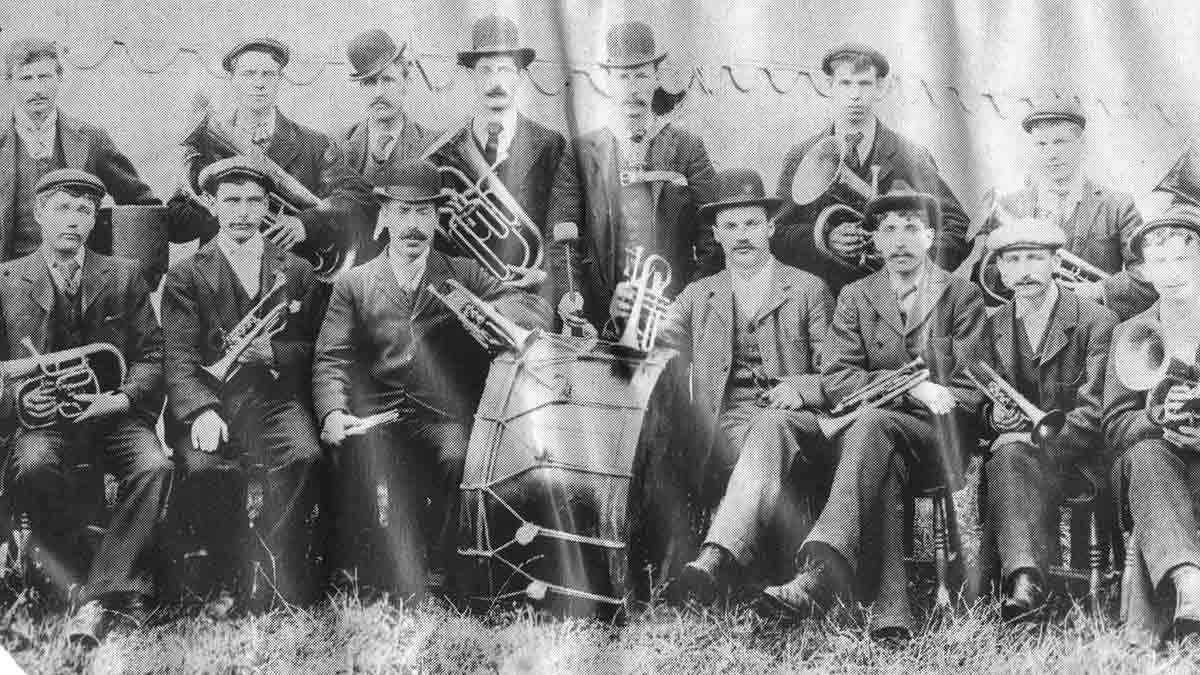By John Fitzgerald
For more than a century, the men and women of St. Patrick’s Brass Band promoted all that was best in Kilkenny’s musical traditions. From the day it was founded in May 1882, it won its way into the hearts of young and old in Cat County. The band’s motto, inscribed on a promotional banner, was “To God and Ireland True.”
It honoured this commitment in style. It entertained at hurling and football matches, led religious processions, and made a point of commemorating emotionally charged political anniversaries, even when the authorities officially banned these.
The band played rousing military marches that stirred up patriotic fervour in Kilkenny in the heady days of political turmoil that marked the first two decades of the 20th century. After independence, it performed in a different atmosphere and more relaxed political climate.
Its much loved formation of bandsmen and stunning majorettes, marching in step with impeccable precision and choreography, brought joy to countless thousands of people in the county and other parts of Ireland.
No major outdoor-festive occasion would have been the same without it. At the beer festival in the sixties and seventies, it proved every bit as competent as the Bavarian band that roused the spirits of drinkers.
St. Patrick’s Band complemented the Germanic airs with good old Kilkenny band music as locals and visitors sang along with their two pint glasses of ale that the smiling maidens lovingly handed down to them in the beer tents.
At a funeral, it could be relied on to strike appropriate notes of devotion, honour and respect to give the dearly departed a memorable send-off. The sound of St. Patrick’s band was special music to the ears of Kilkenny hurlers setting off to do battle in Croke Park and other sporting venues. Hearts fluttered proudly when it played the Rose of Mooncoin before a match or to welcome the team back home to Kilkenny.
A Rebel Band
The band was born in “The Village”, the name given by Kilkenny folk to St. Patrick’s Parish. Among the first subscribers to the band was Martin Coyne of Upper Patrick Street. His gesture of placing a few shillings on a blacksmith’s anvil in The Village was fondly remembered for decades afterwards. It was the day the band members knew their musical venture had a future.
“Sure it’ll keep ye going for a while”, Martin predicted reassuringly.
The band’s first high profile engagement was the funeral in August 1882 of writer and Fenian, Charles Kickham. It led the cortege across the city as far as the Callan road, and a few days later travelled to Kickham’s native Mullinahone for the burial. As the coffin was lowered into the earth, the band played God Save Ireland and a Nation Once Again.
A few months after its formation, the band became embroiled in the political turmoil of pre-independence Ireland. Its president, Pat Hartigan, was the son of prominent Fenian leader, John Hartigan.
On November 23rd, 1882, it led a big procession through Kilkenny to honour the anniversary of the Manchester Martyrs, three Irishmen who had been hanged in 1867 for an alleged murder.
This event passed off without incident, but the following year a police notice banned a similar parade. Constables were instructed to be especially on guard against any attempt by St. Patrick’s band to play rebel music.
In defiance of the ban, thousands of people thronged the streets of Kilkenny as darkness approached. Crowds of cheering citizens shuffled down Rose Inn Street and along John’s Quay.
Police rushed to the banks of the River Nore with batons drawn as flares lit up the water to reveal a line of boats tied together. These craft contained all the members of the illusive band and their instruments.
The constables roared at the men in the boats to surrender, to no avail. The band struck up a tune that had people cheering, whistling and singing, drowning out the police commands to call off the unlawful assembly…
(Picture shows: the band in about 1900. Standing: John Walsh, Tommy Dunne, Tommy Nolan, Pat Corcoran, Jack Carroll, Tom Egan, Brian Fogerty, Mick Walsh, Tommy Meighan. Seated: Pat Devlan, Jack Fahy, Tommy Haide, Jack Holland (coductor), Paddy Cahill, and Joe Cahill.
-John Fitzgerald
To be continued…

















